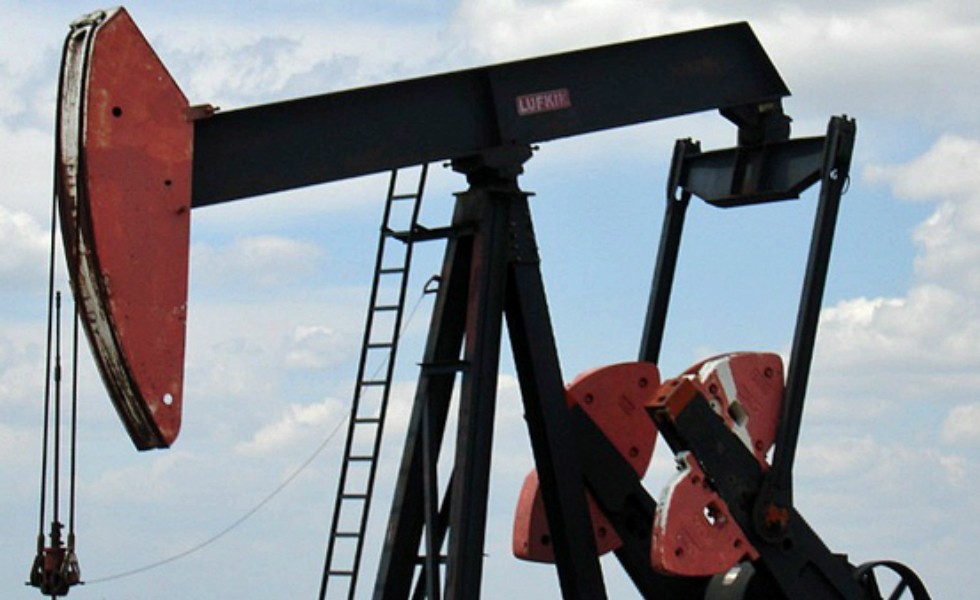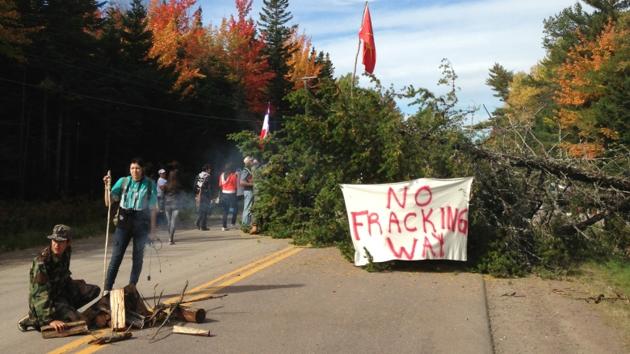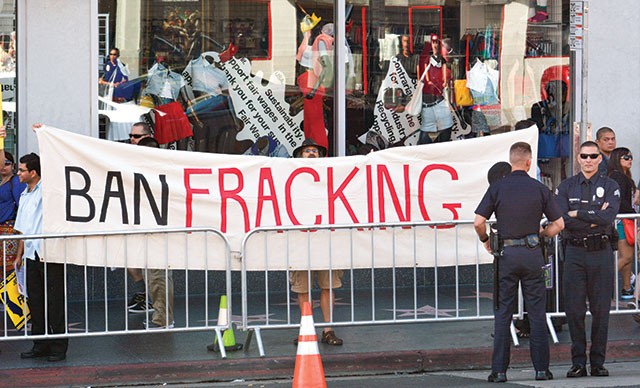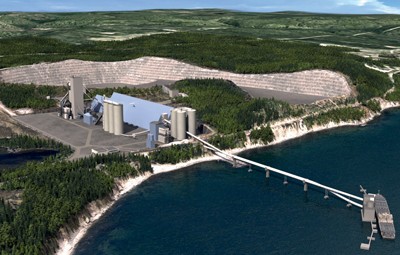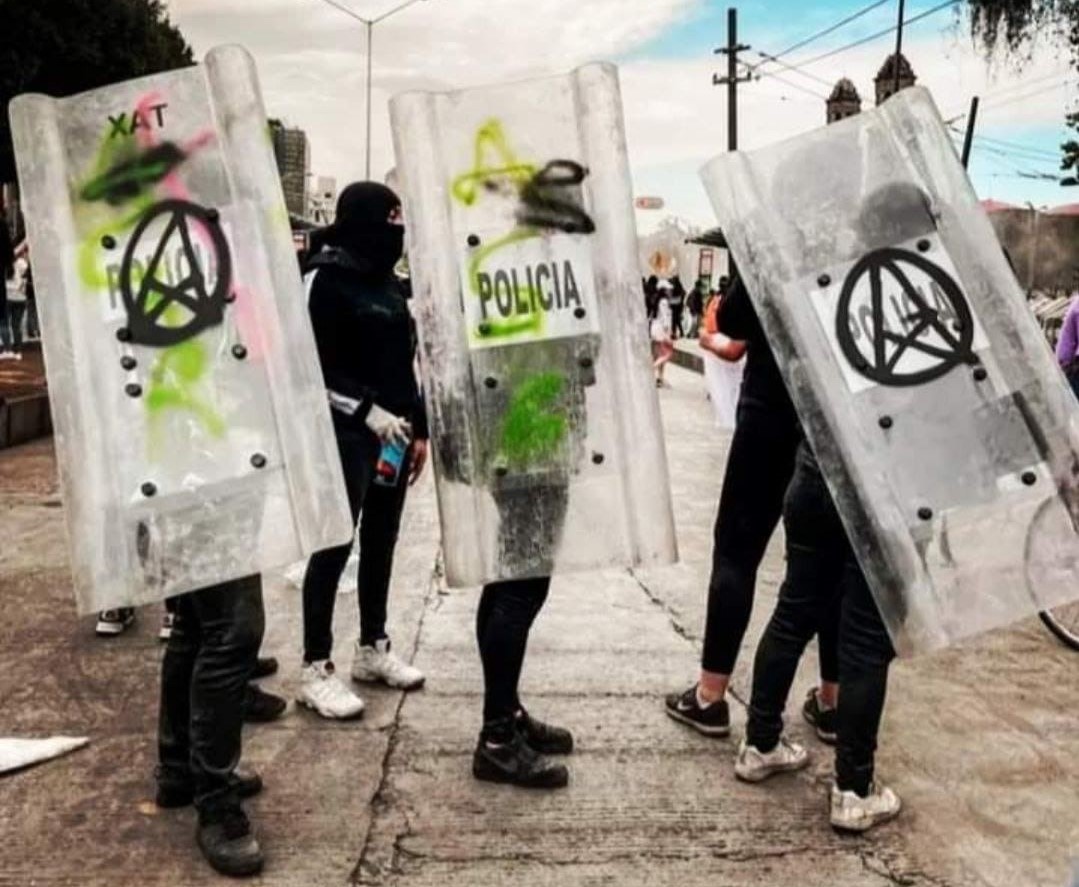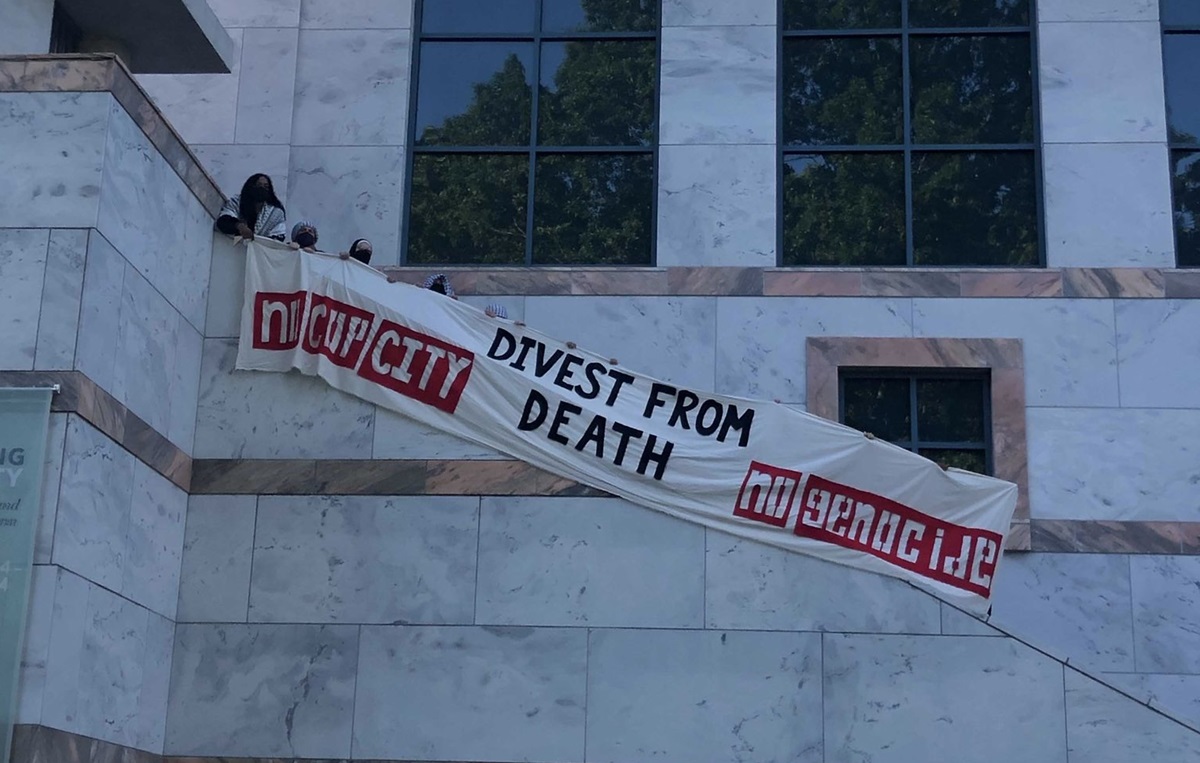Filed under: Environment, Interviews, Quebec
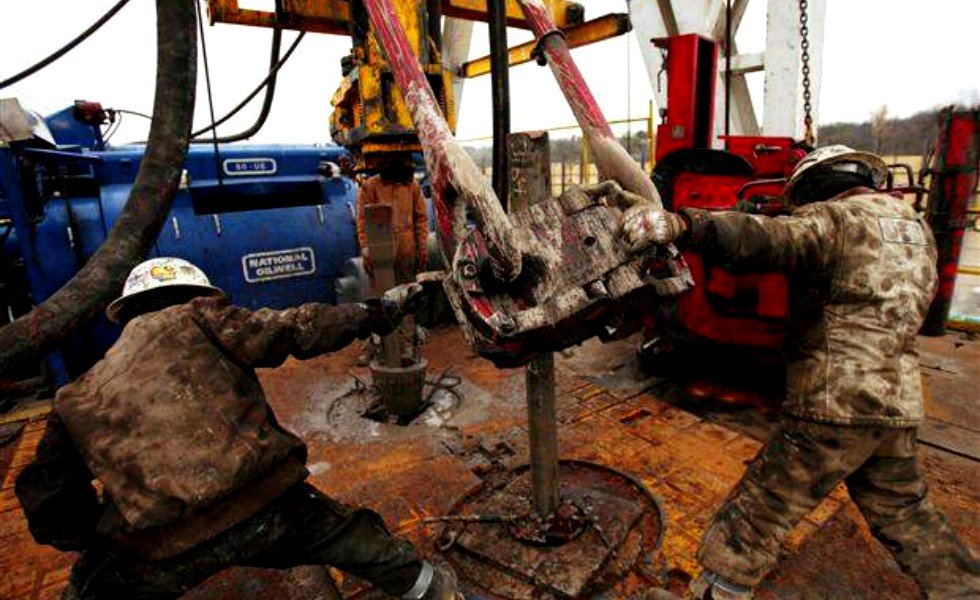
Submitted to It’s Going Down
When I first travelled to Gaspé—a city at the tip of the Gaspé Peninsula in eastern Quebec—I was deeply taken with the magnificence of the terrain. It’s a land where the elemental power of nature makes its presence felt. If you’ve been to Gaspé, you likely know what I mean. If you haven’t, but have only heard of it from people who have been, chances are you’ve felt the enchantment of this place even then, because those who describe their experiences of Gaspé easily fall into a tone of voice and manner of speaking reminiscent of someone recalling a beautiful dream.
For the past few years, folks in eastern Quebec have been doggedly organizing against a slew of major industrial projects that have largely escaped the notice of the non-francophone environmentalist movement. For this reason, I decided to go to Gaspé to investigate the plans for industrialization, as well as the resistance to it.
For decades, there has been exploration for oil and gas in Quebec. The province has somewhat of a unique relationship to oil and gas resources, because separatists there have always wanted to keep control over natural resources for their imagined future nation-state. Nationalists in Quebec up until the present continue to tout “energy independence” as a reason to exploit oil and gas resources.
Oil and gas used to be provincially managed, but there was a big boom of selling leases in 2007, and that’s when a lot of the current players got in the game. The two biggest companies are Petrolia and Junex, which were formed with the help of people who had previously worked for the province.
Petrolia and Junex have now completed test drilling, and both are ready to go into production. They say that they are going to do conventional drilling; activists say that they’re going to have to frack in order for it to be profitable.
A few years ago, the anti-shale gas movement in Quebec was huge. At the height of it, there were over 100,000 people in the streets of Montreal. This paved the way for other mobilizations related to environmental issues. The movement evolved into hundreds of citizen committees organized in regional networks, and then in a provincial network, called Reseau Vigilance Hydrocarbure Quebec.
When the Parti Québécois government of Pauline Marois came to power, all permits to frack were suspended and a moratorium was announced, though never actually made legally binding. Eight days before the Marois government lost the election, the Province of Quebec signed a massive deal with Petrolia.
Last year, Quebec received $10 billion in federal transfer payments, which largely came from Alberta oil money. When the 2017 budget gets made, all that money will be gone, and all of a sudden politicians from coast to coast are going to be rushing to do what Canada has always done to make money, and that’s pillage the land.
In addition to the plans to drill for oil in Gaspé, there have also been a flurry of announcements pertaining to Liquefied Natural Gas (LNG) in Quebec. This is probably because the process of liquefaction involves super-chilling gas to extremely low temperatures, requiring massive amounts of electricity, which is significantly cheaper in Quebec than elsewhere.
Currently, a company called Tugliq is evaluating different possible routes for a gas pipeline to connect the Bourque gas well in Murdochville to Gaspé, a distance of 58 kilometers (36 miles). This gas liquefaction plant would be located in a barge anchored in the Gaspé harbour. The plan is to then use smaller vessels to transport the LNG to the north shore of the St. Lawrence River, where it would be used as a replacement fuel for diesel. Because natural gas is cleaner-burning than diesel, the government is presenting this as a green energy “transition” fuel.
Tache D’huile
When I came to Gaspesie to research this story, one of the things that I was most curious about was Tache d’Huile (oil stain.) The group was started about three years ago to combat proposed oil and gas drilling. They put out an impressive amount of super high quality media, such as short films, and they have a well-produced regular news video-cast (called “La Breche”) that compiles news about environmental issues with a focus on eastern Quebec.
I spent a week living and working with Maude. Maude is an anarchist from Montréal who has been organizing for over 20 years. We both got involved in activism through punk rock. A few years ago, Maude moved to Gaspé, soon to discover that over 80 percent of the peninsula had been leased to oil and gas companies. She now spends the better part of her waking hours working at her desk in the war room of Tache d’Huile, an insulated attic of a barn on top of a mountain in Gaspé.
Maude is one of the founders of Tache d’Huile and is its most active member. She is paid next to nothing—just expenses, sometimes a bit more. She lives in a trailer with a small stove which requires constant stoking through the long and cold winter. To save on fuel, she cooked the next day’s supper on the wood stove while we talked about our dreams, ambitions, and frustrations.
Anon: Why does Tache d’Huile exist? What is your purpose?
Maude: The common core was about drinking water. In Gaspé you can still drink water out of most of the rivers. It’s not an area that’s very industrialized. Hunting and fishing and these kinds of activities are really central to the culture here. And because of different economic situations, there are less people living here than there used to be. No one really comes to Gaspé and says, “Hey, I’m going to make a bunch of money here.” People who choose to stay and live here appreciate the quality of its environment.
We have a specific concern for Mi’kmaq concerns, because this is Mi’kmaq land. We’ve been working towards creating relationships which didn’t really exist very much before.
[Tache d’Huile] was also organized on the peninsula-level, because Gaspé is Crown land. It’s called “non-organized territory,” which means it’s in no one’s backyard.
We have a big stance against fracking. They say that it’s going to be conventional drilling, but sometimes they admit that they might frack. Basically, after the movement against fracking succeeded, they said, “Well if you won’t let us frack down there, then you at least gotta let us drill in the woods!”
A: Could you tell me about Gaspé?
M: Fishing has been the main industry, and the fishermen had huge families. The relationship between the bosses and the workers and their families could best be described as slavery… There’s been quite a few revolts—with people looting the company store—which were calmed down by the Canadian army. Gaspé was highly affected by the collapse of cod stocks, but fishing is still very much present here.
There has been some forest industry, and some mines, following a boom-and-bust cycle. The whole region is pretty dependent on tourism because it’s beautiful. There’s huge unemployment, high rates of illiteracy, really strong culture, strong accents, and lots of autonomous cultural activities. There are lots of Acadians, and you can see it in the flags, you can hear it in the language, poetry, stories, and songs.
Historically, there has been a big pressure to avoid alliances between Mi’kmaq and Acadian and French people, because the English Empire feared the power of this alliance. So it was actually forbidden for people to hang out. The Mi’kmaq people in Gaspé are trained in English, as part of a deliberate historical effort to separate them culturally from their neighbors, and that gulf still exists.
There are three Mi’kmaq communities, two of which are reserves—Gesgapegiag and Listikuj—so about 5,000 or 6,000 of Gaspé‘s population of 80,000 are Mi’kmaq. They’re really involved in salmon fishing, which they had to really fight for.
A: Could you tell me a bit more about the back to the land movement in Gaspé?
M: There are a few intentional communities already on the peninsula and also some really interesting community projects. There’s a lot of intentionality here because there’s no incentive to inhabit here other than the intention to live closer to nature.
There used to be an impression that we couldn’t do agriculture here, but that’s turned out to not really be true. There are some things that won’t grow here, but there’s been a lot of innovation.
It’s trying to figure itself out. It’s more of an intuition, a call. It’s not super-articulated. But the notion of the territory, the beauty, the cleanliness, is really something that we hear from people. Quite a few people who grew up here left and are coming back because they just need to breathe the ocean, they just need to breathe the bay, the salty air, the mountain…
A: What are the goals of Tache d’Huile? What strategies and tactics do you use to achieve these goals?
M: The goal is the integrity and health of the peninsula’s ecosystems and communities. That’s the goal. The main focus is hydrocarbons and the water. A lot of what we do is communication. People are spread out… The issue really wasn’t getting much attention before we began. What’s going on deep in the woods, no one really talks about. Unless we do something about it, it’s just going to go through. So we do research, hold public assemblies, produce educational materials, release press releases, and talk to the media.
We also do actions to try to get consultations and environmental assessments. This isn’t a panacea but forces the company to give a lot of information. It’s not super exciting work, but it seemed necessary to do before we could get anywhere else.
Then there were a few attempts to be more disruptive, to intervene at the offices of the companies themselves. In December 2014, Tache d’Huile supported the initiative of a camp in Gaspé, and turned out to blockade the road leading to the drilling. That was a really interesting experience. Lots of people were excited. It was hard because it was 40 degrees (Celsius) below [zero]. That’s one thing—winter is really long, and that’s one thing that we have to adapt to and figure out how to act in that context. Lots of the drilling happens in the winter.
A: What are your group’s politics?
M: People are anti-capitalist, whether or not they’d identify as such. They’re all people who are involved in alternative projects. They’re very creative… very aware of the creation of autonomy through other means. But they wouldn’t necessarily frame it in activist terms.
The transition is something that comes up a lot. The necessity for transition, not only energetic transition but also food sovereignty. Gaspé is a remote area, so we’re very vulnerable to the petroleum economy for food.
In our basis of unity, there is also an important sentence about solidarity with other struggles. We’re doing our share here as part of a global movement. We’re saying, “It’s not a good idea here, it’s not a good idea anywhere.”
A: Do you think that there exists a will in Gaspé to create a more bioregional autonomy?
Yes, this I believe in. There is a will. There is a lot of mistrust of the state, the provincial state especially because of an operation in the ’70s where they wanted to shut down a lot of villages, and a lot of people resisted. That stayed in the memories of people, that they wanted to shut them down. There is still an impression that Gaspé is disposable in the eyes of the important people of the capital.
Regional autonomy is something that has been talked about in the past. In 1997, 17,000 people gathered in an arena to decide what to do as a region. I think the spirit of the assembly was to say, “Fuck this, we’re not going to be governed by this Quebec- or Ottawa-centralized shit.” There’s water, there’s land, there’s everything to maintain healthy communities here. It’s definitely something that’s physically plausible. It’s present in the culture, it’s present in the poetry. Even though I didn’t come here to fight oil companies, and no one did, my hope is that through fighting them we’re building relationships and capacity that will help us in building autonomy.
It’s a strong intention, and it takes time, patience, and consistency. What we do doesn’t always come out as super rad, but hopefully, slowly and surely, we’ll be more people moving forward together.
A: What issues have you focused on?
M: First off, there’s oil-by-rail. In our area, the rail line goes through the Matapedia Valley, and passes on the southern shore of the Baie des Chaleurs on the New Brunswick side. So, although it’s very close to us as the crow flies, it’s in another province. It terminates at the port of Belledune, which they want to expand, which would allow the increase of the oil-by-rail traffic to a few hundred tanker cars per day.
Belledune is an area that’s already quite contaminated. A few years back, a company tried to build a toxic waste incinerator, which would have been mostly used by the US Military to get rid of toxic waste. That was fought hard by people and it sparked alliances on both sides of the Baie des Chaleurs. That campaign involved civil disobedience.
With the Megantic tragedy [when a freight train full of crude oil rolled down a hill, resulting in an explosion and fire that killed 42], people are way more sensitive to the issue of oil-by-rail, and there are different fights against it all throughout Quebec. We know that the company doesn’t have enough investors or clients to proceed. We’re pretty confident that we’re winning this fight.
For one thing, it’s Mi’kmaq territory, and the Mi’kmaq were not at all properly consulted. The Mi’kmaq on the Quebec side were not consulted at all. We didn’t know if they knew about the project or not. So we showed up at a pow-wow and asked if we could put up a table and share information. We had a big map, and we had the information about which companies had which claims on which lands… People were really curious. We did our best in English and produced some stuff in English. We met some key people. Someone invited us to a meeting of the band council, where they seemed pretty unaware of the project. Not long after that, they sued Chaleur Terminals Inc. and the province of New Brunswick.
A: When I was doing my research about industrialization in Gaspé, I was pretty astounded by the circumstances surrounding the cement plant at Port Daniel. Could you talk about that?
M: Well it’s really fucking big… It’s in a beautiful area. The people there don’t like visitors, I can tell you that much. They’ve been saying that this cement plant is a green project because it’s supposedly much more energy-efficient than other cement plants. Equiterre (the notorious Quebec NGO that got caught cutting backroom deals with tar sands tycoon Murray Edwards) has said that it’s a green project. All this despite that fact that there were no environmental hearings. There was some talk about using petroleum coke (toxic waste produced by tar sands) as fuel, as well as byproducts from the forestry industry. At the present moment it’s not clear what fuel source they’re going to be using.
The whole project required about a billion dollars of investment. Six hundred million came from the Province of Quebec, 200 million was federal, and the rest was private. It’s a really economically vulnerable area, and it’ll create a few hundred jobs.
This is Quebec—there’s a lot of corruption in government awarding construction contracts, and this is a good example of that. In the name of creating jobs, they’ve taken $800 million of taxpayer money and given it to a private corporation to build something totally unnecessary.
Actually, the company’s getting sued right now by the unions from the other cement plants, because they’re all operating below their capacity right now. They’re super pissed that this one cement plant is getting $800 million of public money and they’re getting squat.
It’s under construction now. We gave up fighting against it. We’ll still say that we think that it’s shit, but we were making too many enemies. We decided that it would be best to focus on fighting the petrol industry, which is our reason for existing.
There are 80,000 people in Gaspé. That means, if you divvied up the $800 million the government gave for this cement plant, each child, woman, and man would get ten thousand dollars. So this is the kind of bullshit that makes people resent Quebec (and Ottawa). Can you imagine if they put that money into actually useful community projects, like sustainable agriculture? The economy here would look really different really fast.
A: Some people believe that these proposed oil and gas projects (in Quebec) have more to do with corrupt politicians awarding contracts to cronies than actual plans for commercial oil and gas production. What’s your take on that theory?
M: Quite a few people believe that it’s all a sham. The most obvious argument is that it’s all government money. There’s not a lot of private investment. The state gives them money to explore, and as long as the state gives them money, they’re happy. There’s been so much exploration for decades. If there was something interesting, we’d know already. And if things are suddenly really interesting, it’s because of new technology, which is to say that they plan to frack.
The sham theory is a slippery thing. It brings us into an area where we are not experts at all. We don’t have engineers on staff. If we treat this issue as a sham, people might think “well then, we don’t have to do anything about it.” So we focus on the ecological impacts of drilling and human rights, the fact that people aren’t being given a voice in what happens in the territory that they inhabit.
A: How do you hope that Tache d’Huile develops?
M: I hope that it develops into a network of people willing to do what’s necessary for a viable future, for example, by exchanging DIY technologies and building a resilience that is rooted in the reality of the territory we inhabit. We can generate an abundance here. We can inhabit the heart of the peninsula. There’s water here, there’s everything that we need for a good life.
Closing Thoughts
Maude’s love for the world is of a depth I have rarely witnessed. She is a rare creature who has not only the courage of her convictions, but also the determination to sustain her.
There is a certain glory in revolutionary struggle, because, when push comes to shove, it requires acts of courage. Let it be remembered that moments of glory are as a firefly next to a fire, compared with the many hours of unseen labour that nurtures movements. Activism is work, not undertaken because it is fun, but because it is meant to lead to a desired result.
When I was wrapping up my interview with Maude, I asked her for some inspiring last words. She said: “If we don’t try, we won’t know if it is possible. Maybe it’s not, but we won’t know if we don’t try for real.”
That the world contains people like Maude gives me more cause to hope. I wish that there were more of them, but something tells me that we as a species are redeemable, so long as there are people like Maude amongst us. And I hold hope for her goals, for the evolution of movements tends not to be linear. For better or for worse, the cycle is more of a boom-and-bust one. From time to time, flare-ups such as the Quebec student strike and Idle No More happen, and when they do, all of a sudden, possibilities burst into being, and the long slog of activism pays off. As militants, we anticipate crisis, seeking to turn it to our advantage in our age-old struggle against Capital. A fight against drilling in Gaspé would be an ideal such opportunity, a winnable fight that would bring people together out on the land, where plans for another future could be hatched.


